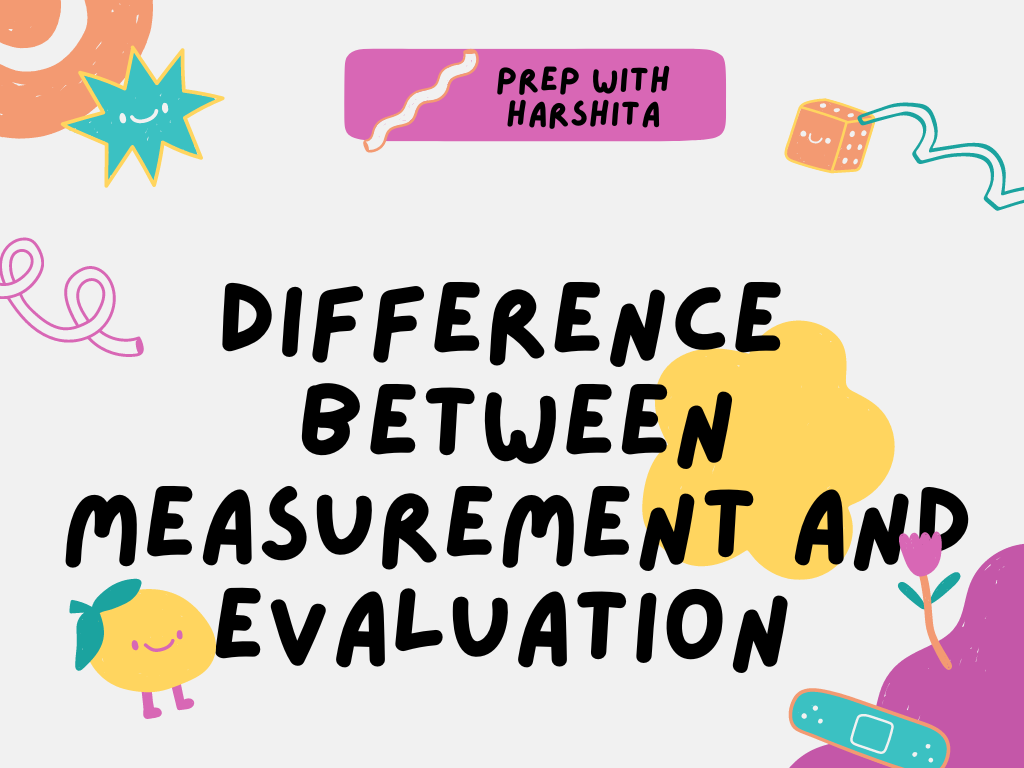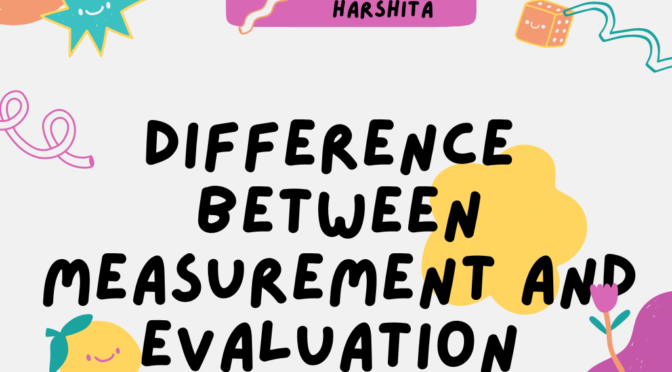Measurement and evaluation are two related but distinct concepts that are often used in various fields, including education, psychology, and business. While they are similar in some ways, they differ in their goals, methods, and outcomes. Let’s explore the differences between measurement and evaluation in more detail.
Measurement
Measurement refers to the process of collecting data or information about a particular phenomenon, often using numerical values. The purpose of measurement is to quantify something so that it can be described or compared. For example, a teacher may measure the number of correct answers on a test to determine a student’s level of understanding of a particular subject. In this case, measurement involves collecting numerical data (the number of correct answers) and using that data to describe the student’s level of understanding.
Measurement can be direct or indirect. Direct measurement involves collecting data or information that is objective and observable, such as a person’s height or weight. Indirect measurement involves collecting data or information that is not directly observable, such as a person’s intelligence or personality traits. Indirect measurement often involves using proxies, such as standardized tests or surveys, to infer the underlying construct being measured.
Evaluation
Evaluation, on the other hand, involves making a judgment or determination about the value or quality of something based on collected data or information. It often involves comparing actual results against expected or desired outcomes or standards. For example, a manager may evaluate the effectiveness of a training program by comparing the performance of employees who completed the training to those who did not.
Evaluation involves making judgments about the effectiveness or value of a particular program, policy, or intervention. It can be formative, meaning they are conducted during the implementation of a program to identify strengths and weaknesses, or summative, meaning they are conducted after the implementation of a program to determine its overall effectiveness.
Key Differences
The key differences between measurement and evaluation can be summarized as follows:
- Purpose: The purpose of measurement is to collect data or information about a particular phenomenon in order to describe or compare it. The purpose of evaluation is to make a judgment or determination about the value or quality of something based on collected data or information.
- Focus: Measurement focuses on collecting data or information, often using numerical values, to describe or compare a particular phenomenon. Evaluation focuses on making judgments about the effectiveness or value of a particular program, policy, or intervention.
- Methods: Measurement involves collecting data or information using direct or indirect methods, while evaluation involves analyzing and interpreting data to make judgments or determinations.
- Outcomes: The outcome of measurement is a set of data or information that describes or compares a particular phenomenon. The outcome of evaluation is a judgment or determination about the value or quality of a particular program, policy, or intervention.
In summary, measurement and evaluation are related but distinct concepts that are often used together in various fields. While measurement involves collecting data or information about a particular phenomenon, evaluation involves making judgments or determinations about the effectiveness or value of a particular program, policy, or intervention based on that data or information.

Also Visit : Prep with Harshita


Do you mind if I quote a couple of your articles as long as I provide credit and sources back to your webpage? My blog is in the exact same area of interest as yours and my visitors would really benefit from some of the information you provide here. Please let me know if this okay with you. Thanks!
With havin so much content and articles do you ever run into any problems of plagorism or copyright violation? My site has a lot of exclusive content I’ve either written myself or outsourced but it appears a lot of it is popping it up all over the web without my agreement. Do you know any ways to help prevent content from being stolen? I’d certainly appreciate it.
With havin so much content do you ever run into any problems of plagorism or copyright violation? My site has a lot of unique content I’ve either authored myself or outsourced but it appears a lot of it is popping it up all over the web without my agreement. Do you know any ways to help stop content from being stolen? I’d definitely appreciate it.
Oh my goodness! a tremendous article dude. Thanks Nevertheless I’m experiencing difficulty with ur rss . Don’t know why Unable to subscribe to it. Is there anyone getting identical rss downside? Anybody who knows kindly respond. Thnkx
Your article helped me a lot, is there any more related content? Thanks!
Betflix2k ฟีเจอร์หลากหลาย เล่นได้ตามสไตล์คุณ
Betflix2k รวบรวมเกมสล็อตที่มีฟีเจอร์แปลกใหม่ หลากหลาย และไม่ซ้ำใคร ไม่ว่าคุณจะชอบเกมที่มีฟรีสปิน ตัวคูณพิเศษ เกมแบบ cascading reels หรือเกมแนวคลาสสิกที่เล่นง่าย เข้าใจไว ทุกอย่างถูกรวมไว้อย่างครบครันในแพลตฟอร์มเดียว
เกมแต่ละเกมถูกออกแบบมาเพื่อให้ “เล่นแล้วรู้สึกสนุกจริงๆ” ไม่ใช่แค่หมุนไปเรื่อยๆ แต่มีจังหวะลุ้น ฟีเจอร์ที่ปลุกความตื่นเต้นในทุกๆ รอบการหมุน และแน่นอน — มีโอกาสทำกำไรแบบคาดไม่ถึงในทุกการเข้าเล่น
โอกาสในการชนะที่มากกว่าด้วย Betflixslot
เกมสล็อตใน Betflixslot ไม่ได้มีดีแค่ความสวยงามของกราฟิกหรือเสียงประกอบที่สมจริงเท่านั้น แต่ยังมีอัตราการจ่ายเงิน (RTP) ที่สูงมากในหลาย ๆ เกม รวมไปถึงฟีเจอร์พิเศษ เช่น ฟรีสปิน, โบนัสเกม, และตัวคูณเงินรางวัล ที่ช่วยเพิ่มโอกาสในการชนะให้กับผู้เล่นทุกคน
นี่คือเหตุผลว่าทำไมผู้เล่นถึงเลือก ทดลองเล่นสล็อตฟรี กับ Betflixslot แล้วค่อยตัดสินใจฝากเงินจริง เพราะแค่ลองเล่นก็สัมผัสได้ถึงความแตกต่างของคุณภาพเกม